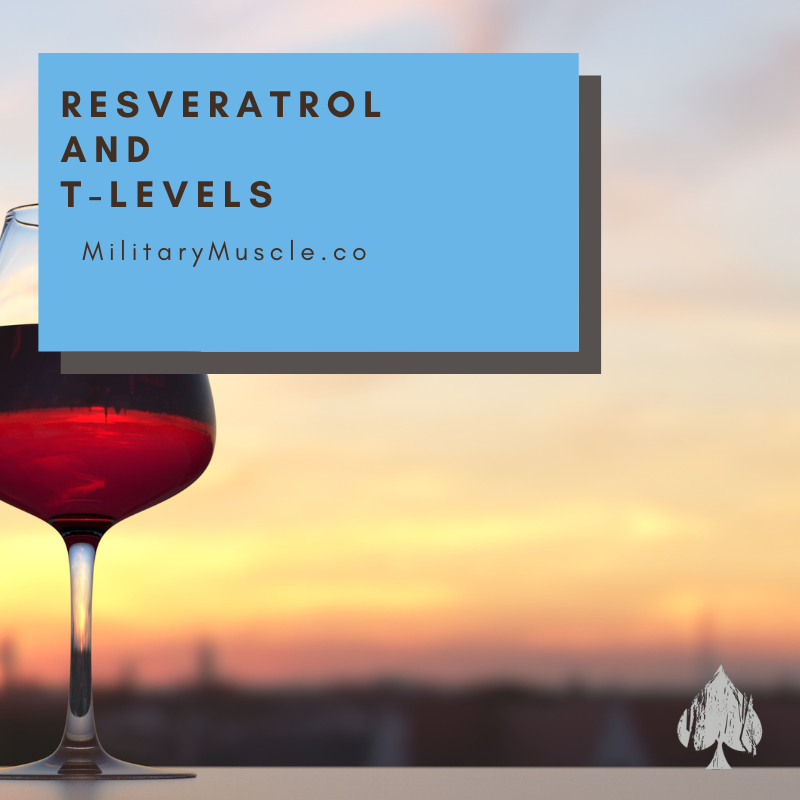Does Resveratrol Boost Testosterone?
Written by Ben Bunting: BA, PGCert. (Sport & Exercise Nutrition) // British Army Physical Training Instructor // S&C Coach.
--
The primary hormone in males is testosterone. The hormone is also responsible for improving the health of bones and muscles, and promoting strength and muscle development.
You'll see a positive impact on your health and wellbeing if you increase your T levels naturally.
This article will discuss current research regarding resveratrol, an active component found in red wines. Does it increase testosterone? Find out more...
What we will cover in this article:
- What is Resveratrol?
- What is the health benefit of a healthy diet?
- Does it increase testosterone according to studies?
What Is Resveratrol?
Resveratrol, also known as a natural polyphenol, is found in peanuts, acai, cranberries (including acai), plums and blueberries. It is also found in red wine, as the grape skin contains large quantities of it. Antioxidant properties mean it is able to fight excessive free radicals in the body.
This active compound contains an enzyme called resveratrol-synthase, a natural chemical that protects plant foods against toxins, sun exposure and diseases. This compound protects DNA in cells.
Resveratrol has been found to protect against heart disease, high blood pressure and insulin resistance.
The nutrient's role in reducing heart disease is sometimes referred to by the term 'French Paradox', due to the relatively high consumption of red wines in France and low cases of heart disease [1].
Bioflavonoids in the food have also been found to reduce fat cell formation, which may contribute to a long-term improvement of body composition.
The nutrient prevents the mesenchymal cell from becoming fat, however it's unlikely to increase metabolism or lead to short-term fat loss.
There have also been claims that it increases lifespan. However, this claim is not supported by science and is only anecdotal.
Resveratrol has been said to boost testosterone. Is this really true? What does the research suggest?
What do the studies say?
Testosterone, the main anabolic hormonal hormone that promotes masculinity and performance in sports is responsible for this. You will notice that your muscle mass and strength increase rapidly when the levels of testosterone are normal.
The anabolic hormonal is constantly fighting against estrogen. This female hormone can lead to a reduction in muscle mass, an increase of belly fat and "man boobs" if levels increase.
Aromatization is the process by which testosterone and anabolic hormones convert to estrogen - something that any man wants to avoid.
Resveratrol increases male hormones by increasing testosterone levels and decreasing aromatization.
In a study in Archives of Pharmacol Research [2], it was found that mice who were treated with a high dose of resveratrol had boosted testosterone levels by 51.6%.
Another study showed that the substance increased activity of StAR - which is a protein responsible for converting cholesterol into testosterone. These are two excellent results for men who want to increase their T-production.
Resveratrol inhibits an enzyme named P450, which regulates aromatization. It not only decreased its activity, but it also reduced estrogen production at the mRNA level.
The same results were also found in another paper written by the author, using a sample with similar participants.
Indirectly, testosterone is indirectly elevated by the decrease in estrogen.
There's one catch, however: none of these studies involved human subjects.
You should be cautious about these findings, even though some testicular tissues of animals are very similar to those in humans.
You'd have to drink a lot more resveratrol than you would get in red wine! To get the amounts used in the studies above, you'd have to drink absurd amounts, that would be almost impossible.
Foods rich in resveratrol are good for your health, regardless of the findings from animal studies. Include berries, and foods that contain this fascinating nutrient as part of your diet.

Resveratrol has been shown in animal studies to increase testosterone levels and reduce aromatization.
Conclusion
Resveratrol, a natural polyphenol, is found in many fruits and berries. The antioxidants in it fight free radical damage, and they promote health and wellbeing.
The antioxidant properties of this substance may help to prevent heart disease, high blood pressure, and insulin resistance. It also inhibits fat cell formation and can aid in weight loss.
Studies on animals show that the substance can boost testosterone directly and inhibit aromatization. While the research has been limited to animal experiments, this is an area of great interest and warrants more investigation.
References
- Constant, J. Alcohol, ischemic heart disease, and the French paradox. Coron Artery Dis. 1997; 8(10): 645-9
- Shin, S et al. trans-Resveratrol Relaxes the Corpus Cavernosum Ex Vivo and Enhances Testosterone Levels and Sperm Quality In Vivo. Arch Pharm Res. 2008; 31(1): 83-87
- Morita, Y et al. Resveratrol promotes expression of SIRT1 and StAR in rat ovarian granulosa cells: an implicative role of SIRT1 in the ovary. Reprod Biol Endocrinol. 2012; 10(14)
- Wang, Y et al. The red wine polyphenol resveratrol displays bilevel inhibition on aromatase in breast cancer cells. Toxicol Sci. 2006; 92(1): 71-7
- Wang, Y et al. Pharmacological concentration of resveratrol suppresses aromatase in JEG-3 cells. Toxicol Lett. 2007 28; 173(3): 175-80




